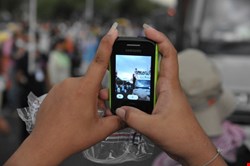
Samsung is by far the largest producer of Android smartphones. According to IDC it sold more than twice as many phones as Apple sold in Q2 2013. It now appears that the South Korean manufacturer has been attempting to introduce its own 'kill switch' version of Activation Lock only to be thwarted by the US carriers (who would need to give approval).
CBS News reports that "when manufacturers like Samsung made smartphones with a kill switch earlier this year, the five major wireless carriers – AT&T, Verizon, T-Mobile, Sprint and US Cellular – wouldn't support it." Emails seen by CBS News say "They've received responses from all five major U.S. carriers and they've all denied our preload in their image..."
The suggestion is that the carriers are afraid of losing revenue based on insurance and replacement phones for those stolen. "We're talking about a $60-billion-a-year industry, and about a half of that seems to be attached to the replacement of phones that are being stolen," said San Francisco DA George Gascon. Almost 50% of all robberries and thefts in San Francisco involve mobile phones.
Earlier this year the carriers' industry trade group, the CTIA, said that a kill switch isn't the answer. According to the New York Times, "CTIA said that a kill switch would pose risks, because hackers who took control of the feature could disable phones for customers, including the phones used by officials in the Department of Defense and law enforcement." This does not, however, appear to be an issue with Apple's Activation Lock implementation.
The carriers' preferred route is expansion of the national database of stolen phones. This is considered by many, however, to be ineffective since the thieves simply sell the stolen phones abroad, outside of the reach of the US database. John Miller at CBS News explained further difficulties: "You have to get on the stolen phone registry, you have to go find your phone, you have to go do this – with the Apple thing, you just say, through one device to another, 'you're a paperweight now.'"
Gascon will not give up on his campaign. “We have repeatedly requested that the carriers take steps to protect their customers," he told NYT. "We are now evaluating what course of action will be necessary to force them to prioritize the safety of their customers over additional money in their pockets."